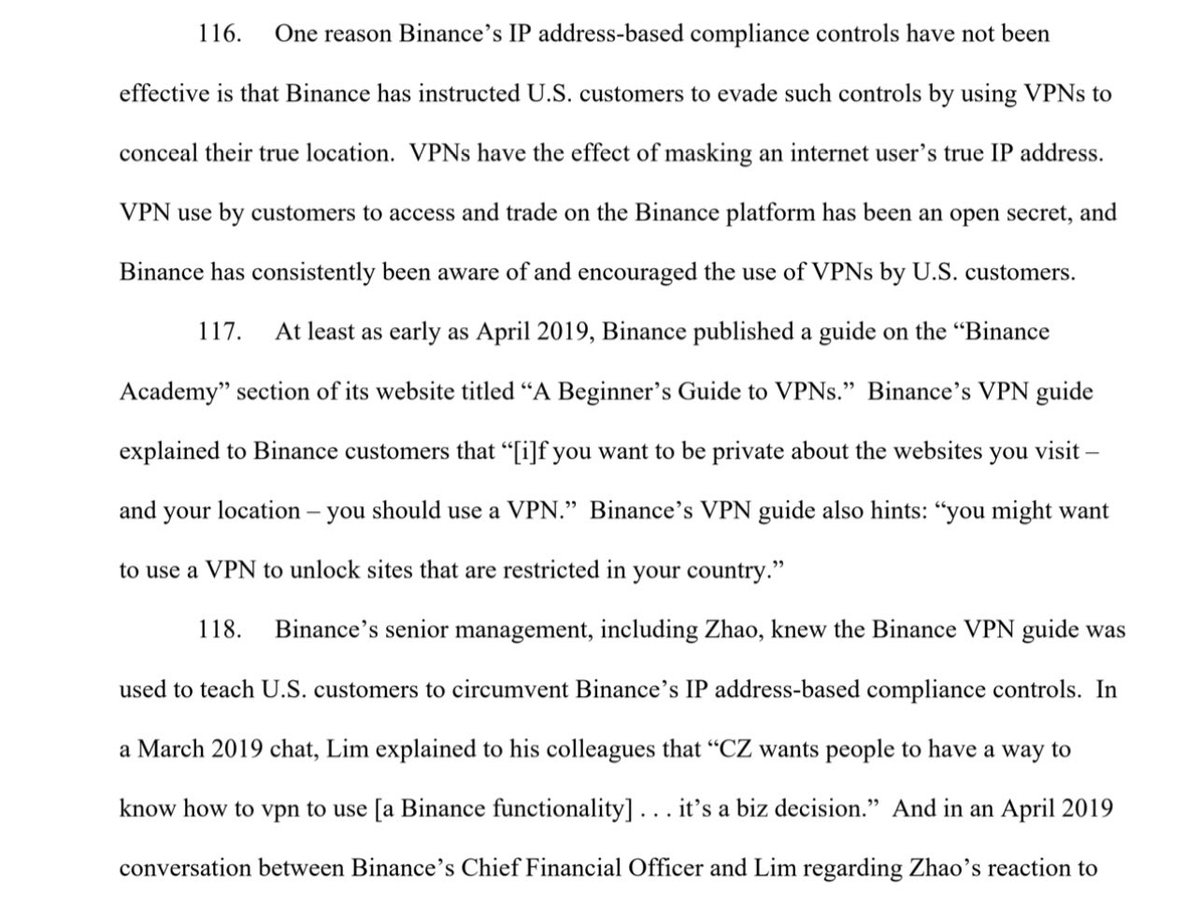Just read the #CFTC legal complaint against #Binance.
If you are too busy to read the 70 pages+ legal filing, here are some key takeaways you need to know:
🧵
If you are too busy to read the 70 pages+ legal filing, here are some key takeaways you need to know:
🧵
1/ the @CFTC states that #Bitcoin, #Ethereum and #Litecoin are commodities. This is interesting considering that SEC chair @GaryGensler said only a couple of days ago that he believes Ethereum is a security. 

2/ the CFCT alleges that CZ is personally involved in details of @binance’s day-to-day (even approving a $60 office expense). The CFTC explicitly mentions that “(CZ) answers to none but himself. Binance has no board of directors.” 

3/ the complaint mentions that Binance has allegedly about 300 “house accounts” that were conducting prop trading.
What type of prop trading exactly is not mentioned.
What type of prop trading exactly is not mentioned.

4/ Binance allegedly never blocked US customers, even after it claimed to do so.
Instead, it apparently only put up a pop-up notice.
Instead, it apparently only put up a pop-up notice.

5/ the 2-BTC limit with no KYC allegedly allowed US clients to trade on the Binance platform without the need to ever conduct KYC.
This was, according to the CFCTC, known by Binance and tolerated as a business decision.
This was, according to the CFCTC, known by Binance and tolerated as a business decision.

6/ Binance allegedly knew that its kyc controls were sub-par but did not want to impact revenues despite the firm representing to regulators that it had relevant controls.
The complaint mentions that Binance even hired a certain compliance firm that would do a “half ass” job.
The complaint mentions that Binance even hired a certain compliance firm that would do a “half ass” job.

7/ The CFTC cites numerous examples of chats of Binance employees including its CCO giving advice on how to allow firms involved in illicit activities to trade on Binance again. 

8/ Binance’s CCO even saw having US customers as a business decision where one solution would be to simply pay a fine. 

9/ Binance allegedly encouraged its U.S. customers to use an VPN and even had a tutorial video titled “A Beginners Guide to VPNs”… 

10/ Binance was allegedly fully aware of the extent of it’s US clients as CZ even asked his team to replace the location of certain clients in their internal system from “U.S.” to “UNKWN” 

11/ the CFTC also takes aim at crypto prime brokers who were providing US clients access to the Binance platform (not too dissimilar to Delta 1 desks in investments banks).
The CFTC explicitly mentions a certain Broker A and Broker B.

The CFTC explicitly mentions a certain Broker A and Broker B.


12/ the CFTC also mentions US based crypto trading firms that were either using VPNs (or an employee’s personal account in one instance!) to trade on Binance.
The CFTC cites 3 such trading firms.



The CFTC cites 3 such trading firms.




13/ For those interested, the full CFTC statement and complaint is available here:
cftc.gov/PressRoom/Pres…
Now what should we watch out for in the coming weeks and months?
cftc.gov/PressRoom/Pres…
Now what should we watch out for in the coming weeks and months?
14/ The CFTC case contains detailed internal chats and correspondence (even a direct reference to CZ’s phone).
How the CFTC obtained this information is still unclear. Was it submitted voluntarily as part of a subpoena? Are former employees collaborating with the CFTC?
How the CFTC obtained this information is still unclear. Was it submitted voluntarily as part of a subpoena? Are former employees collaborating with the CFTC?
15/ The CFTC is also asking for clear action including disgorgement, civil monetary penalties and permanent trading and registration bans.
Following such a complaint, will Binance be permitted to operate again in the US or have US clients again?
Following such a complaint, will Binance be permitted to operate again in the US or have US clients again?
16/ Whilst a regulatory action against Binance was expected, the CFTC here takes aim the crypto prime brokers who were facilitating such transactions.
What will happen to them, at least as it relates to their US clients and/or staff?
What will happen to them, at least as it relates to their US clients and/or staff?
17/ The CFTC also takes action against trading firms who were using offshore shell companies to trade despite having teams based in NY or Chicago.
What will happen to such firms as it relates to their ability to trade on such crypto platforms?
What will happen to such firms as it relates to their ability to trade on such crypto platforms?
18/ This is a legal complaint by the CFTC. What is next? SEC? NYAG? DOJ? In the past, many crypto firms reached a settlement where they paid a large fine and had minimal or limited regulatory/criminal action.
What will be the scenario here?
What will be the scenario here?
19/ What will happen to the other crypto exchanges that also accepted US clients under similar 2-BTC limits with no KYC set-ups or without doing in-depth due diligence?
20/ This follows a historic week when it comes to US regulatory and enforcement developments (you can watch my summary video here:)
https://twitter.com/henriarslanian/status/1640314888185675776?s=46&t=I81T-_LYbMArxUCZz5QWdw)
21/ Interested in more daily crypto updates? Make sure to follow me on Twitter (@HenriArslanian) or join my WhatsApp group ( chat.whatsapp.com/G82OV5YSR8j8nH…)
I post such updates on a daily basis.
I post such updates on a daily basis.

• • •
Missing some Tweet in this thread? You can try to
force a refresh












